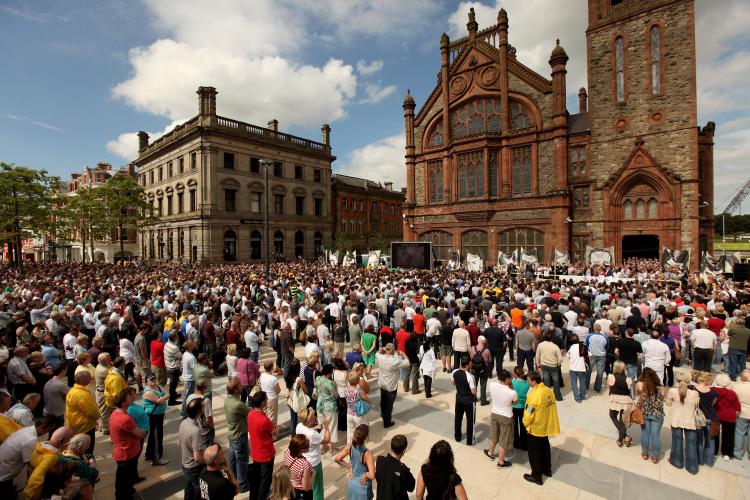LONDON—UK Prime Minister David Cameron said he was sorry on behalf of his country for the deaths of protesters who marched in Northern Ireland 38 years ago in what became known as the Bloody Sunday Massacre.
The apology was delivered in a statement accompanying the release of the long-awaited Saville Report into the shooting death of 14 people by British troops in Londonderry, Northern Ireland, on Jan. 30, 1972.
The PM said Lord Saville had concluded in his 10-volume, 5,000-page report that there was no provocation for British paratroopers to fire on the demonstrators.
Cameron said in Parliament that people “cannot hide from the truth” that the “events of Bloody Sunday were in no way justified.”
The 12-year report—Britain’s longest and most expensive inquiry in history—also concluded that there was no premeditation or complicity on the part of senior officers or politicians, nor did the U.K. government try to cover-up the incident.
The march through Londonderry on the sunny morning in 1972 comprised of Irish republican sympathizers at odds with the pro-union government in London, which they believed was favoring Protestant Christians over Catholics for jobs, housing, and general policing.
The two previously warring sides now have a fragile power-sharing arrangement in Belfast, a relationship neither wants to jeopardize.
Martin McGuinness, Northern Ireland’s deputy first minister, was an Irish Republican Army (IRA) commander on Bloody Sunday. He has always asserted that no IRA members on the march had weapons. However, Lord Saville surmises from nearly 1,000 eye-witness reports, that McGuinness was carrying an automatic weapon, but did not use it.
A previous investigation soon after Bloody Sunday by Lord Chief Justice Lord Widgery was dismissive of the marchers. In his 550-word report, completed in a few weeks, there was no expression of sympathy or regret.
He wrote that the soldiers’ training made them aggressive and quick to react, but he did not think they would open fire if not fired at first. His report also stated that the shooting by some soldiers bordered on being reckless. Widgery intimated that he thought the marchers must have been armed and said civilian casualties were almost inevitable in this kind of campaign.
There is a general feeling that Bloody Sunday and the Widgery report prevented an early peace accord. Five hundred people died in Northern Ireland that year. One hundred were soldiers although none were killed on Bloody Sunday itself.
At the beginning of his statement, the prime minister praised the modern army for their unselfish role in risking their lives on behalf of the nation. He also said that he, and many of his age, felt the events in Northern Ireland were something they had “learned about rather than lived through.”
The apology was delivered in a statement accompanying the release of the long-awaited Saville Report into the shooting death of 14 people by British troops in Londonderry, Northern Ireland, on Jan. 30, 1972.
The PM said Lord Saville had concluded in his 10-volume, 5,000-page report that there was no provocation for British paratroopers to fire on the demonstrators.
Cameron said in Parliament that people “cannot hide from the truth” that the “events of Bloody Sunday were in no way justified.”
The 12-year report—Britain’s longest and most expensive inquiry in history—also concluded that there was no premeditation or complicity on the part of senior officers or politicians, nor did the U.K. government try to cover-up the incident.
The march through Londonderry on the sunny morning in 1972 comprised of Irish republican sympathizers at odds with the pro-union government in London, which they believed was favoring Protestant Christians over Catholics for jobs, housing, and general policing.
The two previously warring sides now have a fragile power-sharing arrangement in Belfast, a relationship neither wants to jeopardize.
Martin McGuinness, Northern Ireland’s deputy first minister, was an Irish Republican Army (IRA) commander on Bloody Sunday. He has always asserted that no IRA members on the march had weapons. However, Lord Saville surmises from nearly 1,000 eye-witness reports, that McGuinness was carrying an automatic weapon, but did not use it.
A previous investigation soon after Bloody Sunday by Lord Chief Justice Lord Widgery was dismissive of the marchers. In his 550-word report, completed in a few weeks, there was no expression of sympathy or regret.
He wrote that the soldiers’ training made them aggressive and quick to react, but he did not think they would open fire if not fired at first. His report also stated that the shooting by some soldiers bordered on being reckless. Widgery intimated that he thought the marchers must have been armed and said civilian casualties were almost inevitable in this kind of campaign.
There is a general feeling that Bloody Sunday and the Widgery report prevented an early peace accord. Five hundred people died in Northern Ireland that year. One hundred were soldiers although none were killed on Bloody Sunday itself.
At the beginning of his statement, the prime minister praised the modern army for their unselfish role in risking their lives on behalf of the nation. He also said that he, and many of his age, felt the events in Northern Ireland were something they had “learned about rather than lived through.”






